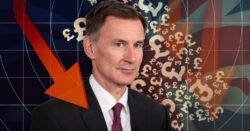Britain will suffer more from soaring inflation and higher interest rates than any other advanced nation (Picture: Bloomberg via Getty Images)
Britain is expected to be the only major power to see its economy shrink this year – faring worse than Russia.
The UK is the only G7 nation power to be in such dire financial straits, according to a grim prediction from the International Monetary Fund (IMF).
It has warned that Britain’s gross domestic product (GDP) will contract by 0.6% against the 0.3% growth pencilled in last October.
Chief economist for the IMF, Pierre-Olivier Gourinchas, explained there were three primary factors motivating the UK’s economic outlook.
He said: ‘First, there is exposure to natural gas… we’ve had a very sharp increase in energy prices in the UK. There is a larger share of energy that is coming from natural gas, with a higher pass-through to final consumers.
‘The UK’s employment levels have also not recovered to pre-pandemic levels. This is a situation where you have a very, very tight labour market but you have an economy that has not re-absorbed into employment as many people as it had before. That means there is less output, less production.
‘The third is that there is a very sharp monetary tightening because inflation has been very elevated, that’s a side effect of this high pass-through of energy prices.’
Pressure has now piled on Chancellor Jeremy Hunt to find a solution for the UK’s spiralling economic downturn.
Jeremy Hunt has been urged to bring Britain’s struggling economy under control (Picture: AP)
Responding to the IMF’s gloomy prediction, he said the country ought to ‘stick to its plan’.
Mr Hunt said: ‘The Governor of the Bank of England recently said that any UK recession this year is likely to be shallower than previously predicted, however these figures confirm we are not immune to the pressures hitting nearly all advanced economies.
‘Short-term challenges should not obscure our long-term prospects – the UK outperformed many forecasts last year, and if we stick to our plan to halve inflation, the UK is still predicted to grow faster than Germany and Japan over the coming years.’
The IMF’s grim outlook for the year ahead puts the UK far behind its counterparts in the G7 group of advanced nations and the only country – across advanced and emerging economies – expected to suffer a year of declining GDP.
The UK’s gross domestic product (GDP) is predicted to shrink by 0.6% (Picture: Daniel Leal/AFP/Getty)
Among the other G7 nations, the IMF’s 2023 GDP predictions show growth of 1.4% in the United States, 0.1% in Germany, 0.7% in France, 0.6% in Italy, 1.8% in Japan and 1.5% in Canada.
It comes against a backdrop of public sector strikes over pay and predictions that the UK is heading for a recession, with inflation still standing at more than 10%.
The IMF said Britain’s predicted GDP fall reflects ‘tighter fiscal and monetary policies and financial conditions and still-high energy retail prices weighing on household budgets’.
There could be hope for slight economic recovery in 2024 however, when the IMF has predicted GDP will rise from 0.9% to 0.6%.
What is GDP?
Gross domestic product or GDP is a measure of the size and health of a country’s economy over a period of time (usually one quarter or one year).
It has been used as a measurement of the country’s economic health since the 1940s.
If the GDP measure is up on the previous quarter, it can be inferred that the economy is growing, and if it is negative, the economy is shrinking.
Further to that, the GDP is widely used to officially dictate whether a country is in a recession.
To measure GDP each quarter, the Office for National Statistics (ONS) collects data from thousands of UK companies.
It combines factors like the total value of goods and services (‘output’) produced, everyone’s income, and what everyone in the country has spent.
The commonly accepted definition of a recession in the UK is when the GDP shrinks for two quarters at least.
What’s more, the organisation offered a chink of light in the otherwise gloomy economic update, predicting that the global slowdown will be shallower than first feared.
It upgraded its global growth forecast, to 2.9% in 2023 from the 2.7% predicted in October as it said the reopening of China after strict Covid restrictions has “paved the way for a faster-than-expected recovery”.
The IMF also said it believes global inflation has passed its peak and will fall from 8.8% last year to 6.6% in 2023 and 4.3% in 2024 as interest rate hikes by central banks begin to cool demand and slow price rises.
But it warned that, in the UK and Europe, surging prices and the impact of action taken to rein in inflation, will continue to weigh on the economy.
A winter of discontent has seen thousands of workers take to the streets and demand better pay
(Picture: Guy Smallman/Getty images)
It said: ‘Consumer confidence and business sentiment have worsened.
‘With inflation at about 10% or above in several euro area countries and the United Kingdom, household budgets remain stretched.
‘The accelerated pace of rate increases by the Bank of England and the European Central Bank is tightening financial conditions and cooling demand in the housing sector and beyond.’
Get in touch with our news team by emailing us at webnews@metro.co.uk.
For more stories like this, check our news page.
Britain will suffer more than most advanced nations from soaring inflation and higher interest rates.





